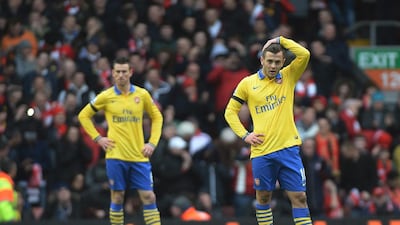In retrospect, of course, it was entirely predictable. All season, the questions were posed about whether Arsenal would falter, whether the central defensive pairing was vulnerable to pace, whether they really believed they could hang on and win the title.
As soon as they faced a major challenge, they faltered.
And that is the sad truth for Arsenal, that, remorseless as they have been in disposing of the lesser lights, at all but one moment of applied pressure they have failed.
In the Premier League, they lost at Old Trafford and the Etihad Stadium. In the League Cup, they lost to Chelsea.
In the Uefa Champions League, they lost at home to Borussia Dortmund and, more significantly, away to Napoli when a draw would have seen them top the group.
Only away at Dortmund did they rise to a real challenge. Even before the 5-1 loss to Liverpool at Anfield on Saturday, behind all the 2-0 wins over mid-ranking sides, the warning signs were there.
The susceptibility to speed was apparent on the opening day of the season, when Aston Villa striker Gabriel Agbonlahor ripped them apart. Arsenal’s greatest achievement this season has been the way they have managed to protect their centre-backs.
The question now is twofold: Can Arsenal find a way of playing that allows them at least to hold other grandees – and they must still go to Chelsea, Tottenham Hotspur and Everton, as well as playing Manchester City at home – at arm’s length?
And after such a devastating defeat, can they pick themselves up for Wednesday's game against Manchester United?
“It’s always a disappointment to lose a game, but I think it was an accident because we have been very stable defensively and we have to treat it like that,” said the manager, Arsene Wenger. “We have just been on a 10-game unbeaten run. You cannot consider one game as the trend, the pattern of our season. It’s an accident, a very disappointing one, but a successful season is decided by how you respond to that. In any season you have disappointments, it is always down to the team to respond in a very positive way. That decides the success of the team.”
The reaction, though, is uncertain. It could be that a defensive performance as inept as Saturday’s shatters confidence and morale, but it could equally be that it reawakens players to their responsibilities.
Teams have suffered worse defeats and gone on to win the title: Newcastle United, beaten 9-1 at home by Sunderland in 1908/09, for instance. Or more recently, Manchester United, beaten 5-0 by Newcastle in 1996/97. Freakish results – “accidents” as Wenger described them – happen.
Usually when a team performs as abysmally as Arsenal did on Saturday, it is impossible to single out an individual, but the way Mesut Ozil stood off Steven Gerrard, allowing him to create the game from deep, was a major factor in the defeat.
“He didn’t have the best of games on Saturday, but that can happen,” Wenger said. “He works very hard to adapt to the physical level of the Premier League, and for me, he is an exceptional player.
“I wouldn’t like to put too much pressure on him, because he has been a top-class player until now. He knows when he is not good enough, he will get questioned – that is normal.”
Facing United is probably the best possible game for Arsenal: United are reeling after another disappointment – a 2-2 draw at home to Fulham – and probably more wracked by self-doubt than Arsenal, but the game is big enough that a victory would feel significant.
And for all the gloom, the fact remains that Arsenal finished the weekend second in the table, just a point behind the leaders. It was a stunning defeat, but it does not need be devastating.
sports@thenational.ae

